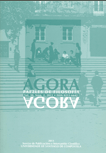John Dewey's theory of inquiry. Quantum physics, ecology and the myth of the scientific method
Contenido principal del artículo
Resumen
La moderna filosofía de la ciencia no ha logrado definir de forma concluyente en qué consiste el método científico. Por el contrario, la práctica científica parece consistir en un pluralismo metodológico, definición que conecta con fragmentos esenciales de la obra de John Dewey, Lógica, Teoría de la Investigación. Para Dewey, incluso las formas de la lógica emergen de los problemas definidos en las situaciones indeterminadas. Un ejemplo histórico fue la introducción de la noción de complementariedad en física, que permitió la interpretación de forma coherente de dos experimentos paradójicos que generaban confusión. El pensamiento de Dewey demuestra su actualidad al ayudarnos a definir el patrón de la investigación. El pluralismo metodológico y la dependencia de la lógica de los problemas de investigación no es algo que vaya a suceder, es algo que ha sucedido y sucede efectivamente en las prácticas científicas.
Palabras clave:
Detalles del artículo
Referencias
Ayer, A. J. (Ed.) Logical positivism, New York, Simon and Schuster, 1959.
Bächtold, M. “Interpreting quantum mechanics according to a pragmatist approach”, Foundations of Physics, 38, 843 (2008).
Bitbol, M. Schrödinger’s philosophy of quantum mechanics, The Netherlands, Kluwer Academic Publishers, 1996.
Blum, L. A. Friendship, Altruism and Morality. London, Routledge and Kegan Paul, 1980.
Bohr, N. “Discussion with Einstein on Epistemological Problems in Atomic Physics”, en P.A. Schilpp (ed.), Albert Einstein: Philosopher–Scientist, The Library of Living Philosophers, Vol. VII, Evanston, Illinois, 1949, pp. 201–241.
Bohr, N. Atomic Physics and Human Knowledge. New York, John Wiley, 1958.
Bohr, N. Essays 1958-1962 on atomic physics and human knowledge. New York, Interscience Publishers, 1963.
Brown, M. J. “John Dewey’s logic of science”, HOPOS: The Journal of the International Society for the History of Philosophy of Science, 2(2) (2012), 258-306.
Burtt, E. A. The metaphysical foundations of modern physical science: A historical and critical essay. New York, Dover publications, 2003.
Castellà, J. Origen e implicaciones filosóficas de las medidas cuánticas sin interacción. La filosofía de la física de M. Renninger, Tesis Doctoral, Universidad Autónoma de Madrid, 2016.
Dewey, J. Logic. The Theory of Inquiry. New York, Henry Holt & Co, 1938.
Faerna, A. M. Introducción a la teoría pragmatista del conocimiento, Madrid, Siglo XXI, 1996.
Gouinlock, J. “What is the legacy of instrumentalism? Rorty’s interpretation of Dewey”, Journal of the History of Philosophy, 28(2) (1990), 251-269.
Hanson, N. R. Patterns of Discovery: An Inquiry into the Conceptual Foundations of Science. Cambridge, Cambridge University Press, 1958.
Healey, R. “Quantum Theory: Realism or Pragmatism?”, Análisis. Revista de investigación filosófica, 5(1) (2018), 111-138.
Heisenberg, W. The physical principles of the quantum theory, New York, Dover Publications, 1949.
Heisenberg, W. Physics and Philosophy: The Revolution in Modern Science, London, Allen and Unwin, (1959) 1971.
Kline, M. Mathematics: The loss of certainty, New York, Oxford University Press, 1980.
Kuhn, T. S. The structure of scientific revolutions. Chicago, University of Chicago Press, (1962) 1996.
Lakatos, I. “History of Science and its Rational Reconstructions”, En Buck R.C., Cohen R.S. (eds.) PSA 1970. Boston Studies in the Philosophy of Science, 8, Springer, Dordrecht, 1971, pp. 99-136.
Maleeh & P. Amani, R. “Pragmatism, Bohr, and the Copenhagen interpretation of quantum mechanics”, International Studies in the Philosophy of Science, 27(4) (2013), 349-363.
Marion Young, I. “Impartiality and the civic republic”. In Feminism as critique: On the politics of gender. Cambridge, Polity Press in Association with Blackwell Publishers, 1987.
Maxwell, N. “A critique of Popper’s views on scientific method”, Philosophy of Science, 39(2) (1972), 131-152.
Naess, A. (1985). “The world of concrete contents”. Inquiry, 28(1-4) (1985), 417-428.
Nolan, L. (Ed.) Primary and secondary qualities: The historical and ongoing debate, Oxford UK, Oxford University Press, 2011.
Popper, K. The logic of scientific discovery, London and New York, Routledge, (1959) 2002.
Popper, K. Quantum Theory and the Schism in Physics: from the Postscript to the Logic of Scientific Discovery, London and New York, Routledge, (1982) 2000.
Psillos, S, “Rudolf Carnap’s Theoretical Concepts in Science”, Studies in History and Philosophy of Science, 31(1) (2000), 151-172.
Puleo, A. H. “Perspectivas ecofeministas de la ciencia y el conocimiento La crítica al sesgo andro-antropocéntrico”, Daimon Revista Internacional De Filosofia, (2017), 41-54.
Rivadulla, A. “La filosofía de la ciencia hoy. Problemas y posiciones”, en J. M. Navarro Cordón (ed.), Perspectivas del pensamiento contemporáneo 2, Madrid, 2004, pp. 109-163.
Rivadulla, A. Meta, método y mito en ciencia, Madrid, Editorial Trotta, 2015.
Rorty, R. Philosophy and the Mirror of Nature, New Jersey, Princeton University Press, 1979.
Rorty, R. Consequences of pragmatism: Essays, 1972-1980, Minneapolis MN, University of Minnesota Press, 1982.
Rorty, R. Contingency, irony, and solidarity, Cambridge, Cambridge University Press, 1989.
Rorty, R. Essays on Heidegger and others: philosophical papers (Vol. 2), Cambridge, Cambridge University Press, 1991.
Rorty, R. Philosophy as Cultural Politics: philosophical Papers (Vol. 4), Cambridge, Cambridge University Press, 2007.
Shook, J. R. “Dewey’s Empirical Naturalism and Pragmatic Metaphysics.” Transactions of the Charles S. Peirce Society 40(4) 2004, 731-742.
Speranza, A. Ecología profunda y autorrealización, Buenos Aires, Editorial Biblos, 2006.
Stapp, H. P. “The Copenhagen Interpretation”, American Journal of Physics, 40(8) 1972, 1098-1116.
Tafalla, M. “La apreciación estética de los animales: consideraciones estéticas y éticas”, Revista de bioética y derecho, 28 (2013), 72-90.
Valor, J. A. “Utilidad y objetividad en la investigación científica”, Revista de Filosofía, 31(2) (2006), 173-188.
Valor, J. A. “Una crítica pragmatista a la filosofía moderna, la realidad líquida”, Revista de discusiones filosóficas, 12(19) (2011), 199-221.
van Fraassen, B. C. Quantum mechanics: An empiricist view, Oxford, Oxford University Press, 1991.
Velasco, A. “Ética del cuidado para la superación del androcentrismo: hacia una ética y una política ecofeministas”, CTS: Revista iberoamericana de ciencia, tecnología y sociedad, 11(31) (2016), 195-216
Artículos más leídos del mismo autor/a(s)
- Joaquín Fernández Mateo, Julia Jambrina Rodríguez, Sostenibilidad Corporativa y Objetivos de Desarrollo Sostenible: innovación para luchar contra la corrupción , Revista Internacional de Comunicación y Desarrollo (RICD): Vol. 4 Núm. 15 (2021): Ciudades y comunidades sostenibles (ODS 11)







